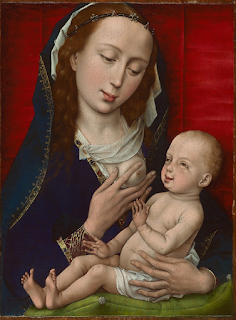Deutsch, from Austria, sells on 4 December 2018 an "Attributed to Rogier Van der Weyden" Virgin and Child, an oil on panel estimated at 2,800 to 5,500 Euro. The combination of "attributed to Van der Weyden" and a 2,800 Euro estimate makes me believe that one or the other is wrong...
The composition is by Van der Weyden, as can be seen in this workshop version in the Art Institute of Chicago. The one for sale is, apart from the background, an extremely close copy of the Chicago one. Only the face of the virgin is less well executed, and the condition of the work (while still remarkably well preserved for a 500 years old painting) is somewhat lacking, although a removal of the yellowed varnish may solve most of this.
I can't find any examples of Van der Weyden himself using such a background in a Virgin and Child. A similar window and landscape is used by a Follower of van der Weyden in the Saint Louis Art Museum.
Even more remarkable are the similarities with a Dirk Bouts Virgin and Child in the National Gallery.Not only does the window have the same general appearance as the other two examples, the crisscrossed windows at the top seem to have the exact same pattern of coloured elements round the border.
Which leaves me rather puzzled. Is this an early Dirk Bouts, who is supposed to have been a pupil of Van der Weyden? A version from the workshop of Van Der Weyden executed by Bouts, who later in his own work reused elements he invented then, like the window? The work isn't good enough to be a mature Bouts (or a Van der Weyden), but it is close enough in quality to be a work of Bouts as an apprentice, a pupil.
Or is it a work by someone who copied a Van der Weyden composition but added a Bouts window to it? That seems strange, certainly if it is contemporary (late 19th and 20th century forgers are more known to combine elements to create "new" works or new copies). Of course, it may also be a copy after a lost (or to me unknown) Van der Weyden or Bouts.
I would love it to be by Bouts, but I know that I sometimes get carried away when I am duped by a good fake. It certainly seems to be worth the gamble at the very low estimate. If it turns out to be the best-case scenario, the value is immense. If it is a good follower of Van der Weyden and Bouts, from around 1500, then it still is worth 25,000 Euro (well, the value depends also on what the cleaning would reveal, if the painting is even better below the yellowing, it only gets more valuable).






No comments:
Post a Comment